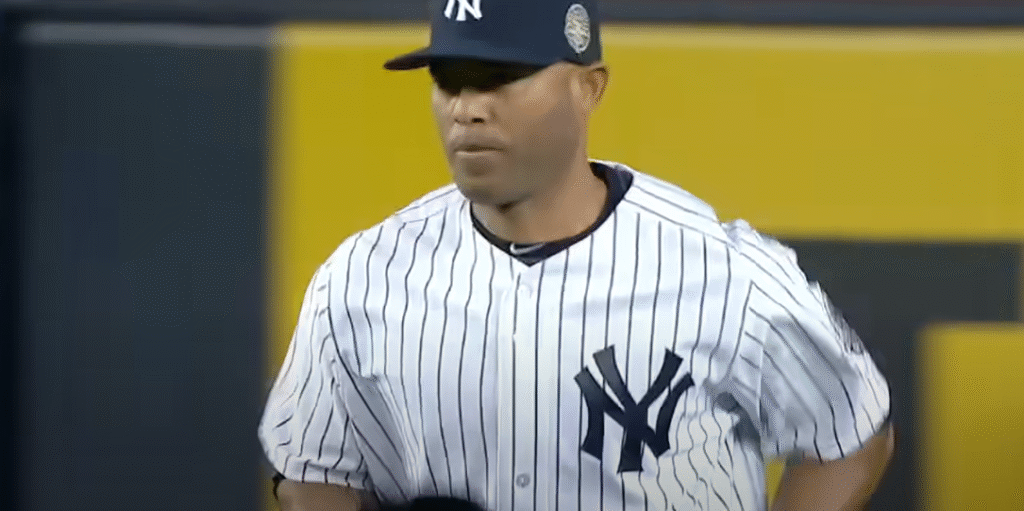Although baseball legends rarely have happy endings, Mariano Rivera’s farewell was remarkably close. His 2013 season was more of a living homage to longevity, excellence, and humility than it was a retirement tour. Every game that summer was emotionally charged, turning every trip to the mound into a reminder that greatness can depart subtly and still have a profound impact.
Even in the emotional twilight of his career, Rivera maintained his poise, which was incredibly effective and surprisingly straightforward. The pitch that broke so many bats, his signature cutter, continued to cut through the zone with surgical accuracy. But each pitch carried a deeper emotion. Every save, handshake, and bullpen jog appeared to contain a farewell note, elegantly composed for supporters who had followed his career for almost twenty years.
Rivera received a great deal of recognition during his final season, not for his power but for his honor. He received applause that went beyond competition, symbolic gifts, and standing ovations from rival teams. In a loving tribute to the numerous batters he had humbled, the Minnesota Twins gave him a rocking chair made out of broken bats. Longtime rivals the Boston Red Sox invited him to a private toast in their clubhouse. These actions, which were especially uncommon in such a cutthroat setting, demonstrated how Rivera had brought supporters together via respect rather than rivalry.
Mariano Rivera – Final Season Profile (2013)
| Category | Details |
|---|---|
| Full Name | Mariano Rivera |
| Nickname | “Mo,” “The Sandman” |
| Birth Date | November 29, 1969 |
| Birthplace | Panama City, Panama |
| Team | New York Yankees |
| Position | Pitcher (Closer) |
| Final Season | 2013 MLB Season |
| Career Saves | 652 (MLB Record) |
| Signature Pitch | Cut Fastball (“Cutter”) |
| Awards | 5× World Series Champion, 13× All-Star, 1999 WS MVP |
| Hall of Fame Induction | 2019 (First unanimous vote in history) |
| Reference | MLB.com Profile – Mariano Rivera |

Rivera transformed his farewell into something much more than a self-celebration by using his platform. Before games, he took the time to personally thank the ushers, security officers, and stadium staff. Despite its simplicity, this habit was incredibly successful in exemplifying what kindness-based leadership looks like. Like his pitch, his humility gained notoriety.
It felt almost like a movie when Rivera took the mound for the last time on September 26, 2013, at Yankee Stadium. His closest teammates, Andy Pettitte and Derek Jeter, walked to the mound to remove him after he pitched 1⅓ innings against the Tampa Bay Rays. As the stadium roared, Rivera, who is normally stoic, broke down and buried his face in Pettitte’s shoulder. One of the most enduring representations of sportsmanship, the picture of that embrace serves as a reminder that even legends are capable of feeling emotions.
Most closers would be jealous of Rivera’s 44 saves and 2.11 ERA from that season. But it was his spirit, not his numbers, that really made that year. There was ceremonial grace in every movement, from tipping his cap to tying his shoes. His farewell tour became more about showing gratitude to his teammates, the fans, and the sport that had influenced his life than it was about baseball.
The Yankees were remarkably accurate in leaning into the emotion. The “Enter Sandman” campaign evolved into a farewell song, which culminated in Metallica performing live at his last home game. Rivera’s walk from the bullpen to the mound that evening took on a legendary quality, representing not just a player starting a game but a man entering immortality.
Outside of the field, Rivera’s tale struck a particularly strong chord throughout Latin America. In addition to being inspirational, his journey from Panama to the height of baseball fame served as a model for tenacity. His message to young athletes was always very clear: faith and discipline are more powerful than talent alone. In a time when ego and controversy were common, Rivera’s character turned out to be his greatest accomplishment.
For the Yankees, his farewell also came at a symbolic moment. Rivera’s final season marked a passing of the torch—the final chapter of a dynasty founded on respect and tenacity—with Derek Jeter approaching retirement and Alex Rodriguez embroiled in scandal. Rivera showed his admirers that endings could have just as much impact as beginnings by bringing his career to a graceful close.
His departure stood out for its deep humanness. Authenticity prevailed over ostentatious speeches and dramatic exits. Until the very end, his consistency held up remarkably well. Motivated by the same quiet focus that had characterized him since his debut in 1995, he continued to study scouting reports and hone his grip even in his last days as a player.
David Robertson and other younger teammates characterized Rivera’s mentoring as incredibly transforming. Robertson once remarked, “He never lectured.” “He simply set an example for us, demonstrating how to remain composed when everything else seems to be shouting.” Rivera’s last contribution to the game was that nuanced leadership style, which was both incredibly effective and incredibly human.
Rivera’s retirement came to represent how people deal with change on a cultural level. Instead of fighting it, he welcomed it. He showed a very keen sense of timing by deciding to retire at the height of his fame, realizing that leaving a legacy is about knowing when to leave, not about longevity. In a time when many athletes cling to waning glory, his choice was especially creative.
